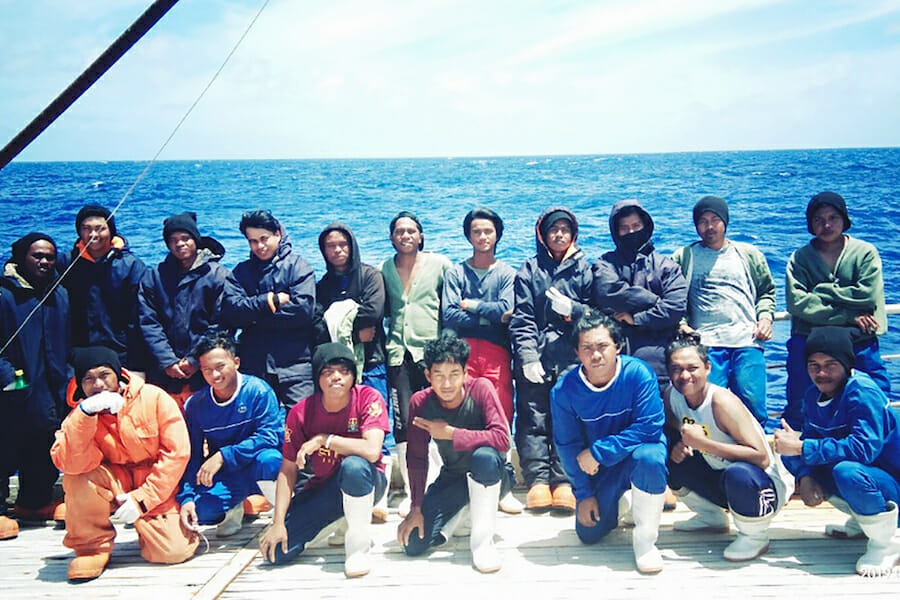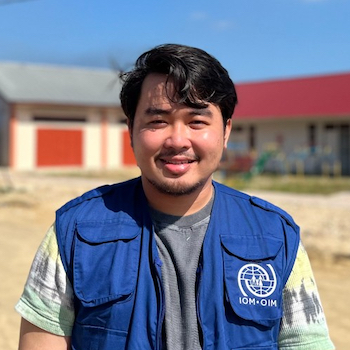
Trafficked Men: Is Indonesia Looking through the Toxic Masculinity Lens?
In early 2020, a short clip documenting the disposal of four dead Indonesian fishermen on a Chinese fishing boat went viral. The death of the fishermen put a spotlight on the inhumane working conditions aboard the vessel and the all-male crew that were the victims of human trafficking. This case raises an important question: what is going on with male trafficking victims in Indonesia?
There is a disparity between the reported number of female and male victims of human trafficking. In 2018, Indonesia’s Anti-Trafficking Task Force reported that 27 percent of the total reported victims were males. This low percentage raises concerns of unreported and undetected cases involving male victims.
Many experts believe that a narrow and repressive description of manhood influences the low number of reported male victims in Indonesia. In human trafficking cases, this false perception often clouds male workers’ judgment, keeping them from seeing their exploitative situation. They often believe that being beaten by their employers is common and tolerable, whereas complaining about it is not “masculine” behavior. They are unaware that beatings are often used as one of the primary means for traffickers to exploit their victims. By not realizing their exploitative situation and having minimum awareness of trafficking, they keep the suffering to themselves.
A 2020 U.S. Trafficking in Persons Report explains that many front-line responders, who should be able to detect and report trafficking cases, also see through a similar lens when viewing men as possible victims of human trafficking. In cases of cross-border labor exploitation, front-line responders often see male victims as migrants who knowingly worked in and often entered a country illegally. They do not usually take sufficient time to find out what abuses they may have suffered at the hands of their employers because they believe that it is not possible for men to be victims of human trafficking. This perception contributes to the underreported and undetected trafficking cases of men for labor exploitation.
On a different note, little understanding is shown towards the sexual exploitation of men. Men’s involvement in commercial sex is always perceived as a voluntary act; therefore, society often believes that men cannot be victims of sexual exploitation. However, a recent case in Medan, Indonesia involving 10 male masseuses who were allegedly exploited as sex workers proves otherwise. The news reported that the illicit practice had been in place for two years, which demonstrates that men can be silenced for long periods in an exploitative environment.
Aside from the controlling behavior of the perpetrators, toxic masculinity forces them off the radar. It creates a barrier for male victims to express their pain and suffering. The community’s stigma toward male sex workers adds to their feelings of shame and fear of re-traumatization. Once more, these situations contribute to the issue of underreported male human trafficking.
The low number of reported trafficked men affects how society and governments provide assistance for male victims of trafficking. Due to sex stereotypes, male victims are often overlooked by service providers and are left without the support that they so desperately need.
Regardless of their sex, victims are entitled to proper shelter, medical and legal assistance, counseling to address any psychological damage, and social-economic reintegration assistance. Unfortunately, male trafficking victims are largely ignored in the formulation of public policy and marginalized in support services. It is not rare to find practices that compromise the safety and well-being of male victims. For example, some areas in Indonesia only have safe houses designated for women and children are who victims of human trafficking, and no such safe houses for men. Male victims are placed in inappropriate quarters, such as a police station without proper bedding.
Another crucial aspect of victim assistance is psychological support. Y. Joel Wong of Indiana University Bloomington found that men often do not express their mental health concerns; therefore, service providers need to read between the lines and evaluate any real problems. Service providers should also have a good understanding of their own sexual biases and how they react to information from male victims. In Indonesia, many service providers are not adequately prepared to work with male victims, as many of them are not able to look at the male victims’ experience in a different light from the female experience.
Reporting on and detecting men who are victims of human trafficking requires uniform acknowledgment of gender-bias and false perception of men who are victims of human trafficking. Upon the acknowledgment, the government, together with the society, can respond accordingly. At the prevention stage, the gender-mainstreaming method should be included in awareness-raising activities to educate the community that men are also vulnerable. Increased awareness of the possibility of men becoming victims of human trafficking may result in more reported and detected cases. On the protection side, front-line officers and service providers should receive resources to build their capacity for gender-sensitivity, especially in non-conventional matters. Indonesia must be willing to shift the current gender-paradigm and tailor efforts to ensure that no Indonesians are left unprotected.
